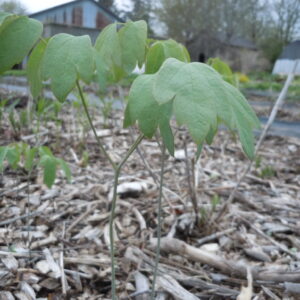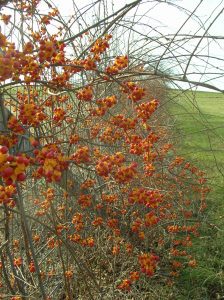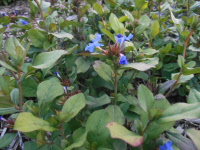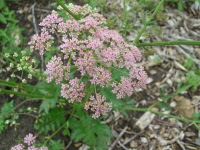Archives
Showing 41–48 of 199 results
-
Catanache caerulea Cupid’s dart Z 4-8
July – September violet cornflower-like flowers with rectangular petals fringed at the ends with deep purple centers.
ARCHIVED
Note: This is a plant not currently for sale. This is an archive page preserved for informational use.
July – September violet cornflower-like flowers with rectangular petals fringed at the ends with deep purple centers.
Size: 16-18” x 8-12”
Care: sun in moist well-drained soil
Native: MediterraneanAn aphrodisiac in ancient Greece. The genus name is adapted from the Greek name for this plant, Katananke which means “forced down against choice” or “compulsion,” as it was believed to be the date rape drug of its day. It is called Cupid’s dart even now because Greeks & Romans used the plant into food of an object of affection. However, it has no actual effect, except perhaps belief in a myth.
-
Caulophyllum thalictroides Blue cohosh Z 3-8
Glaucous blue-green leaves can be mistaken for meadowrue. Blue-berried seeds in fall are its highlight.
ARCHIVED
Note: This is a plant not currently for sale. This is an archive page preserved for informational use.
Glaucous blue-green leaves can be mistaken for meadowrue. Blue-berried seeds in fall are its highlight.
Size: 12-18” x 6-12”
Care: part shade to shade in moist to moist well-drained soil, slightly acidic.
Native: New England, Tennessee & Arkansas
Wildlife Value: its nectar and pollen feed small bees and bumblebees. Deer and rabbit resistantCollected by French planthunter André Michaux before 1800.
-
Ceanothus americanus New Jersey tea, Ping-pong tea Z 4-8
Compact, dense shrub bearing bright green leaves and billowing clusters of fragrant white flowers above the foliage in late spring and early summer.
ARCHIVED
Note: This is a plant not currently for sale. This is an archive page preserved for informational use.
Compact, dense shrub bearing bright green leaves and billowing clusters of fragrant white flowers above the foliage in late spring and early summer.
Size: 3-4’ x 3-5’
Care: full sun in fertile, well-drained soil
Native: eastern North America, Wisconsin native
Wildlife Value: Host for Spring Azure, Summer Azure, Mottled Duskywing butterflies. Birds eat the Seeds. Supports over 30 bee species.Native Americans used Ceanothus americanus to wash injured feet and to cure toothaches, constipation and short breath. Sent to England around 1715 by Mark Catesby, English naturalist. Leaves used extensively to make tea during the American Revolution. Twigs made a cinnamon-colored dye. Cherokee cooked a medicinal tea from the roots to cure toothaches and stomach ailments. Jefferson grew this as part of a shrubbery west of the house at Monticello in 1771.
-
Celastrus scandens Bittersweet, Staff vine VINE Z 4-8
Conspicuous orange fruit in autumn, persisting into winter on the females of this vigorous, native vine
ARCHIVED
Note: This is a plant not currently for sale. This is an archive page preserved for informational use.
Conspicuous orange fruit in autumn, persisting into winter on the females of this vigorous native vine.
Size: 20-30' x 6'
Care: full sun to part shade in any soil except wet. Prune by cutting back fruiting branches in late winter and pinch back branches throughout summer.
Native: Eastern half of North America west to South Dakota and south to New Mexico, Wisconsin nativeName Celastrus derived from Greek “kelastros”. In the mid-1800’s an ointment made from a half pound of Bittersweet root bark simmered with one pound of lard remedied “swelled breasts, discuss or drive away tumors or swellings and also for piles.” Cherokee drank a tea for stomach ailments, chewed the root to cure coughs and washed away bad smells with Bittersweet. HoChunk included the root in a compound to cure colds. 1st collected by Rev. John Banister who moved to colonial Virginia in 1678. A gunman mistakenly shot and killed him while he collected plants. For sale in Bartram Garden’s 1783 Broadside, America’s 1st plant catalog.
-
Centaurium scilloides Carpet tulip, Perennial centaury Z 5-9
Sweetest plant ever - tiny pink tulip-like flowers in constant bloom mid-summer to frost, close at night and open in daytime
ARCHIVED
Note: This is a plant not currently for sale. This is an archive page preserved for informational use.
Sweetest plant ever – tiny pink tulip-like flowers in constant bloom mid-summer to frost, close at night and open in daytime
Size: 2” x 4”
Care: sun to part shade in moist to moist well-drained soil
Native: Atlantic Ocean coasts of Europe, AzoresNamed by Carl Linnaeas the Younger in the supplement to his father’s legendary book Species Plantarum, 1782
-
Ceratostigma plumbaginoides Plumbago, Leadwort Z 5-9
Cobalt blue flower clusters with contrasting, showy red stems
ARCHIVED
Note: This is a plant not currently for sale. This is an archive page preserved for informational use.
Cobalt blue flower clusters with contrasting, showy red stems and calyces in late summer and fall. Foliage turns crimson in fall – excellent groundcover. One of the most award winning plants.
Size: 9-12” x 18”
Care: Sun to part shade in moist well-drained soil
Native: China
Awards: Five (5) of them! Georgia Gold Medal 2006, Elisabeth Carey Miller Botanical Garden Great Plant Picks, Missouri Botanical Garden Plant of Merit, Royal Horticultural Society Award of Garden Merit, Oklahoma ProvenPlumbago is Latin meaning “lead” derived from use of the plant to treat lead poisoning. First collected by Russian botanist Alexander von Bunge in 1830 in Mongolia, then introduced by Robert Fortune who found it growing in Shanghi in 1846. “Bear a profusion of brilliant cobalt blue flowers (when) the leaves take on a distinct reddish tinge.” H.H. Thomas 1915.
-
Chaerophyllum hirsutum ‘Roseum’ Hairy chervil Z 5-7
Airy rose-pink umbels like a short, pink Queen Anne’s lace, blooming in spring to early summer, compliment the fern-like apple-scented fragrant foliage.
ARCHIVED
Note: This is a plant not currently for sale. This is an archive page preserved for informational use.
Airy rose-pink umbels like a short, pink Queen Anne’s lace, blooming in spring to early summer, compliment the fern-like apple-scented fragrant foliage.
Size: 24” x 12”
Care: sun to part shade in moist well-drained soil, cut back to refresh foliage and rebloom.
Native: Spain to Greece
Awards: Elisabeth Carey Miller Botanical Garden Great Plant PickNamed from Greek chairo meaning “to please” & phyllon meaning “leaf,” so named “because the leaves, steeped in wine, and drank, will exhilarate and chear (sic.) melancholy persons… (it) grows naturally on the Alps, and the Helvetian mountains. …the stalk (is) terminated by large umbels of flowers, in which some plants are red and in others white…. These plants are preferred in botanic gardens for variety …” Gardeners’ Dictionary, 1768. 1st Described by Swiss botanist Gaspard Bauhin in 1600’s.
-
Chrysanthemum alpinum syn. Luecanthemopsis alpina Alpine daisy Z 5-
Short white daisies blooming June-August atop basal foliage, spreads to form small mat.
ARCHIVED
Note: This is a plant not currently for sale. This is an archive page preserved for informational use.
Short white daisies blooming June-August atop basal foliage, spreads to form small mat.
Size: 4” x spreading
Care: full sun in well-drained soil
Native: mountains of Europe1st described by French botanist Tournefort, early 1700’s. Wm. Robinson (1883): “A very dwarf plant. The leaves are small, and the abundant flowers are supported on hoary little stems 1 to 3 inches long, are pure white with yellow centres, and are more than 1” across… well deserves cultivation in bare level places, on poor sandy or gravely soil in the rock garden.”





